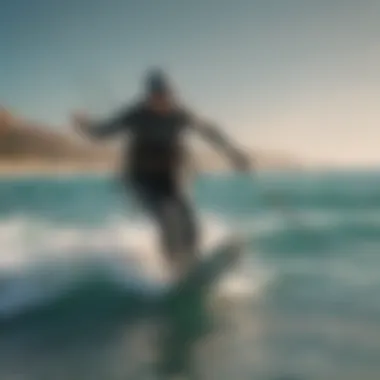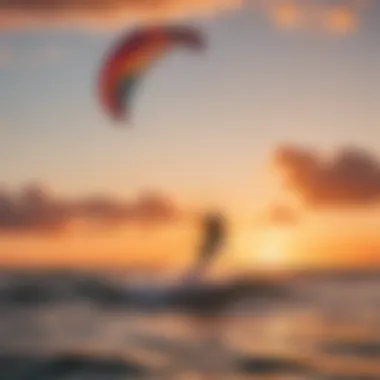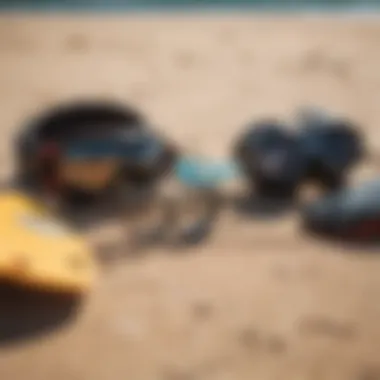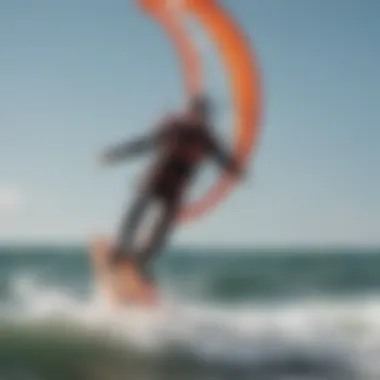Unleash the Thrills of Kitesurfing: Your Ultimate Guide to Soaring Waves


Water Activity Overview
Kitesurfing, an exhilarating water sport combining elements of surfing and kite-flying, has been gaining popularity worldwide. The fusion of wind power and wave-riding offers a unique adrenaline rush for water sports enthusiasts. Unlike traditional surfing or sailing, kitesurfing involves harnessing the wind's force to propel oneself across the water surface while executing breathtaking jumps and maneuvers. This dynamic activity requires a combination of skill, balance, and control, making it both challenging and rewarding.
Tips and Techniques
Tips for beginners
If you're new to kitesurfing, mastering the basics is crucial. Understanding wind directions, controlling the kite, and maintaining proper body position are fundamental skills to focus on. It's recommended to start with smaller kites in lighter winds to build confidence gradually. Additionally, taking lessons from certified instructors can significantly expedite your learning curve and enhance safety awareness.
Advanced techniques for experienced enthusiasts
For experienced kitesurfers looking to elevate their skills, mastering advanced techniques such as jumps, rotations, and transitions can unlock a new level of excitement. Learning how to handle stronger winds, read wave patterns, and execute complex maneuvers with precision requires dedication and practice. Furthermore, exploring different styles of kitesurfing, such as freestyle, wave riding, or foilboarding, can add versatility and excitement to your sessions.
Safety guidelines
Prioritizing safety is paramount in kitesurfing, considering its dynamic and challenging nature. Always conduct a thorough equipment check before each session, ensuring that your gear is in optimal condition. Rigorous adherence to safety protocols, such as wearing a helmet, impact vest, and harness, can mitigate risks and prevent accidents. Additionally, being aware of weather conditions, avoiding crowded areas, and respecting other water users contribute to a safer kitesurfing experience.
Gear Reviews
Kitesurfing Gear Essentials
When it comes to kitesurfing gear, essential items include the kite, control bar, harness, board, pump, and safety leash. Selecting the right kite size based on wind conditions and rider's skill level is crucial to optimize performance. Investing in a durable board with good flotation and maneuverability enhances riding comfort. The harness should provide adequate support and flexibility for seamless control during maneuvers.
Recommended Brands
Several renowned brands in the kitesurfing industry offer high-quality gear for enthusiasts of all levels. From leading kite manufacturers like North Kiteboarding and Cabrinha to board specialists such as Slingshot and Airush, a wide range of options cater to different riding styles and preferences. Staying updated on the latest innovations and technologies can help you choose gear that aligns with your performance goals and riding conditions.
Destination Guides
Top Kitesurfing Destinations
Discovering the world's top kitesurfing destinations opens up a world of adventure and excitement for enthusiasts. From tropical paradises like Mauritius and Brazil to wind-swept coasts in Tarifa and Cape Town, each location offers unique wind conditions and landscapes for kitesurfing. Whether you seek flat water lagoons for freestyle tricks or epic waves for surfing, researching destination guides can help you plan unforgettable kitesurfing trips.
Travel Tips for Water Sports Trips


Preparing for a kitesurfing trip involves more than just packing your gear. Consider factors like visa requirements, travel insurance, local regulations, and emergency contacts to ensure a smooth and safe journey. Researching accommodation options near kitesurfing spots, arranging transportation for your gear, and checking weather forecasts in advance can maximize your time on the water. Embracing the spirit of adventure and exploration, kitesurfing enthusiasts can traverse the globe in search of the perfect wind and waves.
Introduction to Kitesurfing
Kitesurfing, also known as kiteboarding, is an exhilarating water sport that combines elements of surfing, windsurfing, and paragliding. This section serves as a gateway to the captivating world of kitesurfing, providing a foundational understanding of its techniques, equipment, safety measures, and top destinations. Whether you are a novice eager to embark on your kitesurfing journey or an experienced rider seeking advanced tips, this guide will equip you with essential knowledge to unleash the thrills of kitesurfing.
Understanding the Essence of Kitesurfing
History and Evolution of Kitesurfing
Kitesurfing has a rich history that dates back several decades, with roots in early forms of sailing and surfing. The evolution of kitesurfing from traditional water sports to a high-adrenaline extreme sport reflects society's embrace of adventure and adrenaline. This section will delve into the historical milestones, innovators, and technological advancements that have shaped kitesurfing into its modern form, offering insights into the sport's progression and impact.
Key Components of Kitesurfing Gear
The gear used in kitesurfing plays a pivotal role in ensuring a safe and enjoyable experience on the water. From specialized kites to performance-oriented boards, each piece of equipment has unique functionalities designed to enhance performance and maneuverability. This subsection will unlock the secrets behind selecting the right gear for your skill level and preferences, shedding light on how different components work together to create a seamless kitesurfing setup.
Physique and Fitness Requirements
Achieving mastery in kitesurfing goes beyond technical skills and gear proficiency—it also demands a level of physical fitness and body awareness. Understanding the physical demands of kitesurfing, including core strength, balance, and endurance, is essential for maximizing performance and preventing injuries. This part will outline the fitness prerequisites for kitesurfing, emphasizing the importance of conditioning and flexibility in harnessing the power of wind and waves.
Safety First: Essential Precautions
Importance of Proper Training
One of the most critical aspects of kitesurfing is receiving adequate training from certified instructors. Proper training not only instills essential skills and knowledge but also cultivates a culture of safety and responsibility among riders. This section will underscore the significance of investing in quality training programs to build a strong foundation for your kitesurfing journey, ensuring that safety remains a top priority in every session.
Weather Conditions and Risk Assessment
Navigating the dynamic elements of wind and water is fundamental to kitesurfing, making weather conditions a significant factor in planning and executing sessions. Understanding how weather patterns influence kite performance and safety is key to avoiding potential hazards and maximizing time on the water. This subsection will provide insights into interpreting weather forecasts, conducting risk assessments, and making informed decisions based on environmental variables.
Emergency Procedures
While kitesurfing is a thrilling adventure, it also entails certain risks that necessitate preparedness for emergency situations. Having a clear grasp of emergency protocols, including self-rescue techniques and communication strategies, can greatly enhance your safety margins on the water. This part will outline essential emergency procedures, equipping you with the knowledge and skills to respond effectively to unforeseen challenges and ensure a safe kitesurfing experience.
Mastering Kitesurfing Techniques
Kitesurfing is a thrilling water sport that requires mastering various techniques to navigate through the waves effectively. In this section, we delve deep into the pivotal aspects of mastering kitesurfing techniques, offering insights into the essential skills needed to harness the power of the wind and surf. Understanding and implementing these techniques are crucial for both beginners and experienced kitesurfers, as they form the foundation for an exhilarating and safe kitesurfing experience.


Launching and Landing with Precision
Launching and landing are critical elements of kitesurfing that demand precision and skill to ensure a smooth and controlled execution. In this section, we break down the importance of mastering the art of launching and landing, emphasizing the significance of proper techniques in enhancing overall performance and safety on the water.
Controlled Takeoff Strategies
Controlled takeoff strategies are essential for a successful start to a kitesurfing session. These strategies focus on initiating flight smoothly and maintaining stability during takeoff, reducing the risk of crashes or mishaps. By understanding and practicing controlled takeoff strategies, kitesurfers can optimize their performance and enhance their riding experience, making it a crucial element to master.
Smooth Landing Techniques
Smooth landing techniques are pivotal for safely concluding a kitesurfing session. Mastering the art of landing gracefully not only minimizes the impact on the body but also ensures a seamless transition from water to land. Kitesurfers who excel in smooth landing techniques can prolong their sessions and reduce fatigue, highlighting the importance of this skill in kitesurfing.
Dealing with Gusts and Changing Winds
Adapting to gusts and changing winds is a skill that distinguishes proficient kitesurfers from novices. Mastery of techniques to handle sudden gusts and shifts in wind direction is crucial for maintaining control and stability while riding. By learning how to anticipate and react to these changes, kitesurfers can enhance their performance and safety, making it an essential aspect of kitesurfing proficiency.
Navigating the Waves Like a Pro
Once airborne, navigating the waves with skill and finesse becomes paramount for an exceptional kitesurfing experience. This section delves into the techniques required to ride like a pro, covering essential maneuvers and strategies to conquer the waves with confidence and mastery.
Riding Upwind and Downwind
Riding upwind and downwind efficiently is key to covering distances and mastering control over the direction of travel. Understanding the nuances of riding in different wind conditions and angles enables kitesurfers to optimize their performance and explore new horizons on the water. Delving into the specifics of riding upwind and downwind provides insights into maximizing efficiency and enjoying longer, more rewarding kitesurfing sessions.
Executing Turns and Jumps
Executing turns and jumps adds an element of excitement and skill to kitesurfing, allowing riders to perform exhilarating maneuvers on the water. This section focuses on the techniques involved in executing sharp turns and impressive jumps, emphasizing the balance between finesse and agility required for successful aerial tricks. Mastering these skills elevates the kitesurfing experience, offering riders a sense of achievement and progression in their performance.
Harnessing the Wind's Power
Harnessing the immense power of the wind is at the core of kitesurfing mastery. This segment explores the dynamics of utilizing wind energy to propel forward, maneuver through waves, and execute dynamic maneuvers with precision. Understanding how to harness the wind's power optimally allows kitesurfers to enhance their speed, agility, and overall control, making it a fundamental skill for achieving peak performance on the water.
Essential Gear for Kitesurfing Success
When embarking on the thrilling journey of kitesurfing, ensuring you have the right gear is paramount to your success and safety. The equipment you choose can make a significant difference in your kitesurfing experience, from enhancing performance to mitigating risks. By understanding the nuances of each gear component and selecting wisely, you can elevate your skills and maximize your enjoyment on the water.


Choosing the Right Kitesurfing Equipment
Types of Kites: Bow, C-shaped, Hybrid
Kites come in various designs, each catering to different riding styles and skill levels. The bow kite is known for its user-friendly nature, providing stability and easy relaunch capabilities. On the other hand, C-shaped kites offer more power and lift, ideal for advanced riders looking to perform tricks and maneuvers. Hybrid kites combine features of both bow and C-shaped designs, offering versatility for a range of conditions. Understanding the distinctions between these kite types allows you to choose one that aligns with your kitesurfing goals.
tRACKe123RE5
Selecting the Appropriate Board
The selection of a kitesurfing board is crucial, as it directly impacts your performance on the water. Boards vary in size, shape, and construction, catering to different riding styles such as freestyle, wave riding, or freeride. Factors like board length, rocker profile, and fin setup influence how the board interacts with the water and wind, affecting your control and agility while kitesurfing. By choosing the right board that suits your riding style and skill level, you can enhance your overall kitesurfing experience.
Safety Gear: Harness, Helmet, Impact Vest
Prioritizing safety is non-negotiable in kitesurfing, making the use of safety gear imperative. A harness secures you to the kite, providing control and preventing fatigue during long sessions. A helmet protects your head from potential impacts, while an impact vest offers additional buoyancy and protection. Incorporating these safety essentials into your kitesurfing gear checklist not only safeguards you against injuries but also instills confidence to push your limits in the water.
Maintenance and Care Tips for Your Gear
tHE boardF51evelopmentent 1Departm53estuTEst
Cleaning and Storage Guidelines
Proper maintenance of your kitesurfing gear is essential to ensure longevity and optimal performance. Cleaning your equipment after each session removes salt, sand, and debris that can wear down materials over time. Storing kites and boards in a cool, dry place away from direct sunlight prevents damage from UV rays. Following a regular cleaning and storage routine preserves the quality of your gear, extending its lifespan for continued kitesurfing adventures.
Inspecting Lines and Bridles Regularly
The lines and bridles of your kite are crucial components that require regular inspection for wear and tear. Frayed lines or damaged bridles can compromise the safety and functionality of your kite, affecting control and responsiveness in the water. By checking these elements before each session and addressing any issues promptly, you ensure a secure kitesurfing experience with reliable equipment.
Repair Techniques for Minor Damages
Despite proper care, kitesurfing gear may encounter minor damages that require repair. Familiarizing yourself with basic repair techniques such as patching small tears or replacing broken lines empowers you to address issues quickly and effectively. Having a repair kit on hand with essential tools and materials allows you to tackle common damages on the spot, minimizing downtime and keeping your gear in top condition for uninterrupted kitesurfing excursions.
Exploring Top Kitesurfing Destinations
Kitesurfing is not just a sport but a thrilling adventure that takes enthusiasts across the globe. Exploring top kitesurfing destinations adds the element of discovery and excitement to the kitesurfing experience. By venturing into different locations, kitesurfers can encounter varied winds, waves, and landscapes, presenting them with unique challenges and memorable moments that contribute significantly to their skills and satisfaction. Understanding the nuances of different kitesurfing spots helps enthusiasts broaden their horizons and seek new thrills beyond familiar waters.
Global Hotspots for Kitesurfing Adventures
- Dakhla, Morocco: Nestled on the edge of the Western Sahara, Dakhla boasts vast lagoons and consistent winds that make it a hotspot for kitesurfing enthusiasts. Its remote location offers a tranquil setting for riders to immerse themselves in the sport without distractions. The key characteristic of Dakhla is the buttery smooth water surface, ideal for both beginners and advanced riders. Being less crowded than other popular destinations, Dakhla provides a serene kitesurfing experience with a backdrop of stunning desert landscapes.
- Tarifa, Spain: Situated at the southernmost tip of Europe, Tarifa is renowned for its strong winds, making it a mecca for kitesurfers seeking adrenaline-pumping rides. The key characteristic of Tarifa is its Levante and Poniente winds, offering diverse conditions for kitesurfers of all levels. The unique feature of Tarifa lies in its vibrant kitesurfing community, creating a lively atmosphere that energizes riders and fosters camaraderie. Despite its popularity, Tarifa's charm remains intact, providing a blend of thrilling water action and lively coastal vibes.
- Maui, Hawaii: Known for its consistent trade winds and world-class waves, Maui stands out as a paradise for kitesurfers looking for a challenge and adrenaline rush. The key characteristic of Maui is its legendary wave breaks at spots like Ho'okipa, attracting seasoned riders from around the globe. The unique feature of Maui is its fusion of kitesurfing culture with laid-back Hawaiian vibes, offering riders a blend of excitement and relaxation. While Maui's popularity draws crowds, the island's diverse kitesurfing spots cater to varied preferences, ensuring an unforgettable experience for every rider.
Off-the-Beaten-Path Gems for Kitesurfing
- Watamu, Kenya: Tucked away on Kenya's coast, Watamu is a hidden gem for kitesurfers seeking unspoiled waters and uncrowded beaches. The key characteristic of Watamu is its pristine conditions with steady winds, making it an ideal playground for kitesurfing adventures. Despite its secluded location, Watamu offers a warm hospitality that enriches the kitesurfing experience, allowing riders to connect with the local culture while enjoying their time on the water.
- Paracas, Peru: Positioned along Peru's Pacific coast, Paracas beckons kitesurfers with its dynamic wind conditions and breathtaking landscapes. The key characteristic of Paracas is its combination of strong winds and diverse kitesurfing spots, catering to riders of all skill levels. The unique feature of Paracas lies in its proximity to the Paracas National Reserve, where riders can admire mesmerizing desert views and abundant wildlife between exhilarating kitesurfing sessions. Embracing a sense of adventure, Paracas offers kitesurfers a perfect blend of thrill and natural beauty.
- Mui Ne, Vietnam: Nestled on Vietnam's southeastern coast, Mui Ne allures kitesurfers with its consistent cross-onshore winds and extensive sandy beaches. The key characteristic of Mui Ne is its ideal wind conditions for freestyle and wave riding, providing enthusiasts with ample opportunities to hone their skills. The unique feature of Mui Ne is its vibrant kitesurfing scene, where riders can immerse themselves in a lively community of fellow enthusiasts and experienced instructors. With its charming mix of authentic Vietnamese culture and adrenaline-fueled kitesurfing, Mui Ne presents riders with a unique and rewarding kitesurfing experience.















